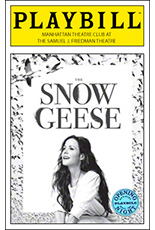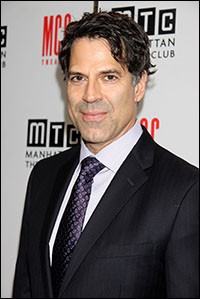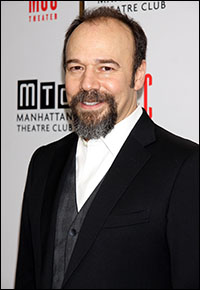
Mary-Louise Parker actually seems to be fluttering her way through The Snow Geese, the new Sharr White play that premiered Oct. 24 at the Samuel J. Friedman Theatre.
As well she should. They're birds of a feather. A frail flower in widow's weeds elegantly designed by Jane Greenwood and living in an upstate old money hunting lodge handsomely rendered by John Lee Beatty, she is a beautiful sacrifice to the turbulent World War I times. To ease her through her eight-week-old depression over her husband's death, her smitten brother-in-law — the doctor in the house — treats her to tea, sympathy and laudanum, a then-popular tincture of opium.
This keeps her racing from the dinner table in tears, unheard in shouting matches and oblivious to her sky-is-falling finances. While the world undergoes a major upheaval, she is a barely visible thin-reed at the center of a building social storm that will cast her adrift like the lost souls in a Chekhov play. In terms of meeting the winds of change head-on and going with the flow, this is not exactly Scarlett O'Hara.
Put another way, she is Mother Snow Goose. There really are snow geese, according to playwright White: Arctic birds that migrate north every year in large flocks to partake of that bracing cold and are greeted with hot lead from sportsmen, disappearing en masse. It's an apt metaphor for what awaits the humans in this play.
To hear Parker tell it, the hardest part of this role to act was hostess to any kind of hunting party: "I'm so averse to hunting, in every possible way. If you're hunting to feed your family and that's your only way, there's something heroic about it. But hunting for sport? I can't connect to that at all, except it has become such a ritual to this particular family — everything surrounding it — and she is connected to ritual." Director Daniel Sullivan said he was drawn to the piece by the writing: "Sharr is an American playwright who is interested in the American past and likes to draw direct lines from our past to our present — not in obvious ways, either. Here, he looks at a family defined by money — that sort of misshapen American idea that money defines you, and he was able to take that idea to this outpost-y world of Syracuse in 1917."
[flipbook]
The Parker he directs here is radically different from the one he directed to a Tony for Proof (his Tony-winning vehicle as well). "It was a great joy to work with her before, and we picked up where we left off," the director relayed. "I love her instincts. I depend upon them as a director. One of the things that has happened to Mary-Louise since I last worked with her is that she has become a mother. That side of her I thought would be fascinating to explore. I find the most moving sections in the play for me are the scenes where she is dealing with her children. You can see the good mother there who hasn't been able to function that way for quite a while."
One such scene, which she played with some suddenly found strength, occurs at the end when she sees No. 1 son off to World War I, assuring him everything will be all right. Given her history of delusion, opium-induced or otherwise, this seems tantamount to a kiss of death. "You never know, you never know," countered Sullivan. "What she's trying to provide him with is well-founded hope when she talks about him as someone who can walk through hailstorms and never be touched. There's every possibility that he'll make it through, but you know what her fears are because she details the number of people who have died in the various conflicts."
Indeed, The Snow Geese is all aquiver with characters who have terrible backstories and absolutely no compunction about sharing them with the audience. "That part of the play is very Chekhovian," the director pointed out. "Chekhov's characters are always more than ready to tell you their complaints about life and what has happened to them. They all have their stories that define them in some way."
Even the sunniest person on the premises (relatively speaking) — Parker's excessively Methodist sister, played by Victoria Clark — has moved herself out of a personal tragedy. A decade back, her daughter died, and she now wears dark plum instead of black, which comprises Parker's entire wardrobe (save for one hallucination scene).
"Victoria," the director beamed, "is someone who'll surprise you on a nightly basis, as most of these actors will. If you see the show twice, you'll never see the same performance. She works very much in the moment, which is somewhat unexpected since she's so associated with musical theatre. In the musical performances of hers I've seen, I've always thought, 'Man, there is a real actor in her.' When she did Juno over in Encores!, I thought, 'She doesn't need that music. She can play it straight.'"

Buy this Limited Collector's Edition |
Clark laughed out loud when asked if this was her Broadway debut as a dance captain. (She assisted in a few fleeting dances that Sullivan's wife, Mimi Lieber, provided for the show.) "Don't you love how big the billing was?" she hooted.
And what did she do as a dance captain? "Nothing," she shot back, pausing a beat before adding, "Eventually, I'm going to have to do something, but not right now."
When The Snow Geese ends, Clark will climb back into her flying harness (currently filled by Mrs. Danny Burstein, Rebecca Luker) and resume her miracle-making as Cinderella's fairy godmother, quietly hoping for another shot at straight theatre. "I wish someone would cast me in a comedy. I'm the craziest, silliest person I know."
In addition to zinging some choice zingers, she has the best line in the show, helping Parker out of a white dress and into her regulation black: "'I remember as a child the day I realized the world was divided into women who wore black and women who didn't.' She puts the white dress away in the closet and comes back with the black dress. 'Always alarming when you realize you've moved to the other side.'" Clark does such a heartfelt reading of that line, one has to ask what she's thinking when she says it. "I remember as a little girl when my mom was stuffing things away in her closet, and I asked, 'Can we be this way forever?' And she said, 'No. Things always change. Nothing's ever going to stay the same.' Sometimes, when I'm saying that line, I'm thinking about that. Sometimes, I'm thinking about sending my son off to college and how I never thought I'd see the day. This is one of our play's themes.
"I'm Mary-Louise's sparring partner here. We disagree about how to raise the kids. It's a wonderful role — very complex and tricky. She's wry and very compassionate. I'm also the peacemaker and the one person in the play who can see we're going to survive. No matter how bad it seems to be getting, we're all going to make it."
| |
 |
|
| Christopher Innvar | ||
| Photo by Joseph Marzullo/WENN |
"This play was a labor of love for me to do, but, at the start of it, I was terrified because I'd never done a German accent before, and that was unbelievably hard to learn. A woman named Charlotte Gleck taught me — a taskmaster and loving at the same time. I completely credit her for my performance. I mean it. She's wonderful."
It's an accent that he might not immediately abandon. His next job is at The Met in Die Fledermaus, playing the nonsinging role of Frosch, the drunken Austrian jailer that has been newly revised and overhauled by Douglas Carter Beane. "I could use that accent," he tentatively allowed, "but I'm not sure that's the way Jeremy [Sans, the director] wants it to go. I've no idea. We start rehearsing the end of November."
As the cause of it all — the happy hedonist who wastes his inheritance to the eternal detriment of his immediate survivors but mercifully dies of a massive heart attack in front of the family without ever knowing the damage he has done them — Christopher Innvar entered the play D.O.A. but was still allotted a single scene at the top of Act II. Echoing happier times, he's a randy toy-ghost for Parker to play with in the attic.
"My character is the father of the family, and it's all my fault," Innvar admitted. "He was put on earth to have a good time. He's sort of a fun-loving, partying, financially irresponsible guy, who inherited a fortune and squandered it very quickly, leaving the family in dire straits without them really knowing what was happening.
| |
 |
|
| Evan Jonigkeit | ||
| Photo by Joseph Marzullo/WENN |
Their war-bound firstborn is played by an empathetic Evan Jonigkeit. "I really enjoyed the character," he said. "He's somebody I can personally relate to in a lot of ways because, in my family structure, I was sort of the showman for many years of my life. Duncan comes in and sorta has to put on a show for everybody. It's like the false bravado that so many young people bring home to their family, and it's kind of a joy to be that image for a family. In my own family — all of whom I love very much — I always get a kick out of making them laugh and watching them enjoy themselves."
Terrific Broadway bows are made in The Snow Geese by Brian Cross, the No. 2 son who unearths the father's frivolous sense of finance that put the family homestead up for sale, and Jessica Love, a maid who comes from where they are headed.
"I serve as a musical counterpoint to the main melody of the play," the actress explained. "I'm the personification of everything that they are terrified is going to happen to them: I've lost my money, I've lost my status, I've lost every marker I had previously used to identify myself. It's all gone, and I'm now without title, without wealth, without family. And this family — the Gaeslings — is poised on the precipice of having to have a similar reckoning themselves, and so my presence in their household is a constant reminder of everything that they are most afraid of.
| |
 |
|
| Danny Burstein | ||
| photo by Joseph Marzullo/WENN |
The opening-night audience was top-heavy in high-profile playwrights, some of them Pulitzer Prize winners like Doubt's John Patrick Shanley, Driving Miss Daisy's Alfred Uhry and the soon-to-be-revived Dinner With Friends' Donald Margulies (who's so excited about the reviews of his latest revival, The Model Apartment at Primary Stages, he's hunting for a theatre to put it in for an extended run; Broadway may apply). Similarly, Richard Maltby Jr. is so excited about how well Taking Flight, the aviation musical he wrote with David Shire, took off at Montclair State University recently he plans to tune it up for a NYC landing. And A.R. Gurney, there with wife Molly, said his latest, Family Furniture, will world-premiere Nov. 24 at The Flea Theatre with Carolyn McCormick, Peter Scolari and Andrew Keenan-Bolger.
McCormick, whose hubby Byron Jennings is off boiling and bubbling as a witch to Ethan Hawke's Macbeth, was also present as was Taye Diggs, newly Tony-ed director Pam MacKinnon, Donna Murphy and Shawn Elliott, director Jo Bonney and her cast of Small Engine Repair (Keegan Allen, James Ransome, John Pollono and James Badge Dale) which opens at the Lucille Lortel Nov. 22, Ron Raines, who has yet to shave his dome for Daddy Warbucks which he'll play Dec. 10 to the end of Annie's run Jan. 5, Adam Duritz and, returning together to the scene of their last triumph, The Assembled Parties, Jessica Hecht and director Lynne Meadow.
































